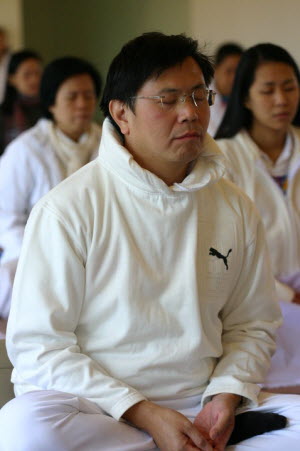Blessing Nineteen:
Abstaining from Unwholesomeness
Abstaining from Unwholesomeness

B. MORAL APPROACHES TO UNWHOLESOMENESS
When comparing different systems of ethics, usually you will not find much disagreement in the discussion of what constitutes a good deed — however, when you come to the morality of avoiding evil, suddenly there is a lot more controversy.
People like to do what they feel comes naturally and if you look at man to try to find out what appears to be the natural state of man you will come across a lot of surprises. If you were to describe what ought to happen to a rock when you drop it, it falls to the ground every time, so it is easy to make up a rule. However, if you try to make up a rule to describe what man ought to do in any situation, even if you expect the best of intentions from man, you will often be disappointed. Even if you take the most crude system governing morality, such as the law, you will find that many people disobey it. Even though people know perfectly well what is right and wrong, they still do misdeeds, and you might argue that if the nature of man is to be disinterested even in the most basic of morality, that it is not man that is the measure of morality, but it must lie elsewhere. Indeed, according to the rationale of Phramonkolthepmuni, the Great Abbot of Wat Paknam:
“Force needs to be applied to improve people’s virtues. The mind is like water which tends to sink to its own depth. Without effort, the mind’s virtue, like water, will fall to the lowest level — that is the performance of evil deeds. If normal people are to develop their minds to the level of the arahant, then efforts need to be made. The mind has to be brought under control until it comes to a standstill. Thus, to govern others, there need to be rules. There needs to be something to force people to become better — and there need to be penalties for breaking the rules.”
If the rules are to be better than man himself, to make him better, then the question arises where they should come from. The answer to the question is different in different ethical systems depending on what each takes as its ideal. In general, you can summarize the origin of these rules under three headings:
1. Artificial Morality: artificial morality where the Law court decides what is right or wrong and retribution is man-made;
2. Theistic Morality: where decisions about what is useful or useless behaviour are attributed to a supreme supernatural being. In deified religions such as Christianity or Islam, sin originates from displeasure or disloyalty to the will of this Supreme Being and can also be nullified by confession and penance to that being. Supposing the Creator ordered Christians always to think of God and never to take His name in vain — if they were to blaspheme or use God as a swearword — because that is against God’s will, it is a source of sin. Because God and not the perpetrator is the source of the sin, this logic can lead to strange beliefs such as that sin can be transmitted from parents to their children. Adam and Eve ate the forbidden fruit in the Garden of Eden and so committed the primordial sin. As a result of that action all subsequent generations down to the present day all have to suffer as the result.
3. Natural Morality: This does not mean doing ‘whatever comes naturally’! It refers to guidelines for morality which are not attributed to any supernatural source, but which are passed down from a time when men were wiser, more insightful, perceptive and shameful than in the present day. The men did not make the rules but observed the long term consequences of the behaviours — thereby coming up with recommendations for how to behave in order not to risk regret at a later time. It is just like a person who vainly tries to wear shoes that are two sizes too small for them. No-one says such behaviour is good or bad — but the truth is that by wearing them, later they will suffer from pain as a result. Thus, natural morality is not a system of judgements, but a description of the likely consequences of behaviours in the long term.
As we shall see, the Buddhist understanding of wholesomeness and unwholesomeness accords to natural morality.










